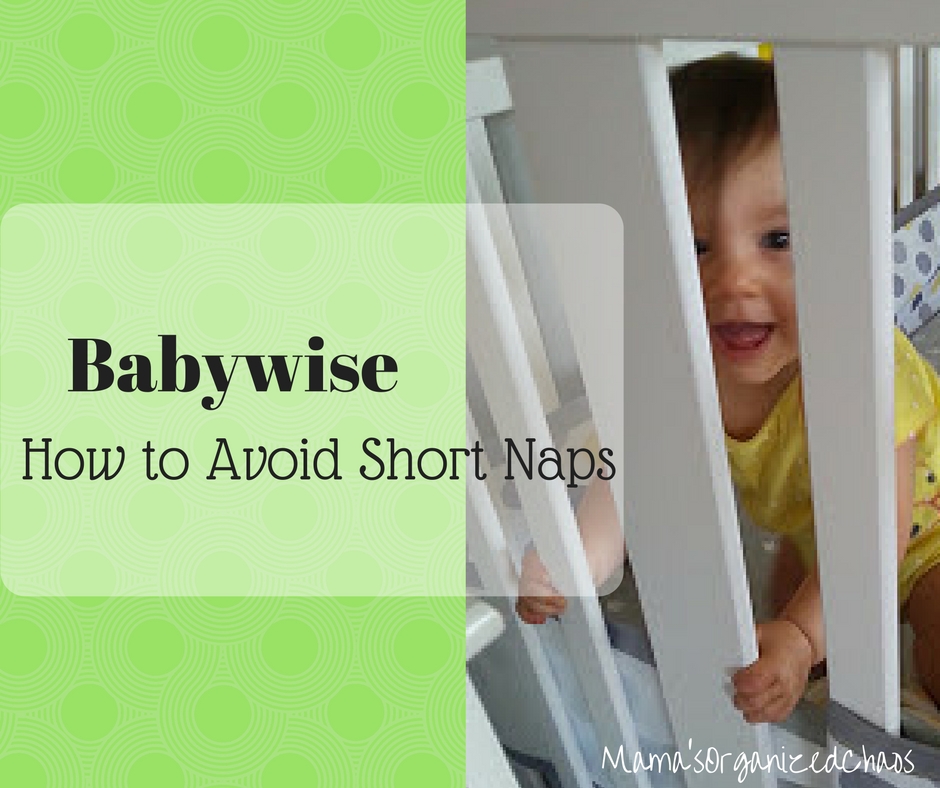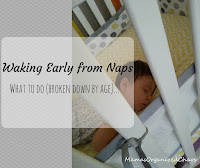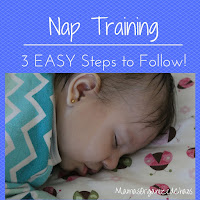Visit a Babywise discussion group, and one of the most frequently asked questions you’ll find, is about babies & toddlers taking short naps, and what to do about it!
We expend all of our energy, as Babywise parents, trying to solve the mystery of the short nap, trying to avoid it if at all possible, and trying to get our children the best sleep possible.
We know that, if you can help your child sleep enough, and sleep well, they will thrive in all areas! So, I wanted to take a moment to discuss ways to avoid the short nap all together!
|
|
|
In my post “Waking Early From Naps- What To Do“, I discuss how I handle short naps.
I’ve broken it down by month for the first 6 months of age. In this post, however, we’re going to discuss how to avoid the short naps all together, or how to troubleshoot them if your child is experiencing a short nap phase…which by the way… it’s inevitable that they will at some point.
The key is knowing how to get out of the phase and preventing the phases as much as possible!
There are two main things you’ll want to first consider:
1. Consider your child’s nap length
2. Consider your child’s mood when they wake
When these two items are considered together, you will have much better insight as to WHY your child is waking early.
- If your child is waking happy and content, it is highly likely that they were not tired enough prior to their nap. They most likely need longer wake times in their eat wake sleep cycles.
- If your child is waking happy and content, and is also practicing a newly learned skill (sitting, standing, walking, talking, etc), it is very likely that they needed more stimulation during their wake time- specifically practicing those skills.
- If your child is waking unhappy, and it has only been 30 minutes or less, this indicates a state of being overtired or overstimulated. You’ll need to be the judge of which based on past behaviors.
- If nothing changed, and your child was handling the wake time fine prior to this phase, they are likely overstimulated. Take a look at your wake time activities and be sure to have more restful time prior to their nap.
- If you recently made a change to your child’s schedule and incorporated more wake time, this is probably the culprit.
- If your child is waking unhappy, and it has been closer to 45 minutes, you are in for a mystery to solve! This is the 45 minute intruder that you’ll see mentioned in discussion boards like crazy. There is no one reason for the 45 minute intruder. It takes some problem solving to figure this one out. Some typical reasons are:
- Wake times aren’t long enough
- Baby isn’t sleep trained yet, and doesn’t know how to transition sleep cycles
- Learning new skills and is excited to practice them
- Cold/hot/uncomfortable in some way
- Hungry
There are some things that you can always do to help avoid the short nap phases from popping up. You can also start doing all of these things if you are in a short nap phase to see if anything helps. These are good practices to incorporate to your daily routine on a regular basis!
How to avoid short naps:
1. Make sure your baby is full
Whether you are breastfeeding, formula feeding, or your child is on all solids…make sure they are getting enough to eat! What once was enough, might not be enough tomorrow.
Watch their cues, look for signs that they are in a growth spurt, and follow their lead.
This does not mean to allow your baby to snack all throughout the day.
This means that when it is time to eat, you make sure that they get full feedings and eat enough at that time.
Snacks will only detract from this ultimate goal.
A hungry baby or toddler is going to have a hard time sleeping. For toddlers, check out my post on establishing good eating habits.
2. Teach your baby how to transition sleep cycles using some form of nap training or sleep training
This is one of the most essential skills that you’ll need to teach your baby. Sleep doesn’t come natural for most babies, contrary to public belief!
We all go in and out of sleep cycles, where we are in periods of light sleep and then transition back to deep sleep.
Our goal is to help our babies learn to transition back to deep sleep (instead of waking up).
You’ll want to do some form of sleep training or nap training with your child as early as possible (all out sleep training should not be done prior to your baby having the ability to self soothe). Check out my posts below to help get started:
2. Make sure that you are following a consistent schedule that works for your baby
There is no book (not even the Babywise book) that will tell you the perfect schedule for YOUR baby.
The recommended schedules in the book will be starting points. It is your job to perfect those schedules to meet the needs of your child.
You’ll need to observe your child’s behaviors and cues and make a schedule that’s right for you.
Our schedules seemed to always be one month ahead of what was recommended in the Babywise book. That’s ok!
We found the ideal schedules for our daughter, and she thrived on them. Take the time to find the schedule that works for your child, and always be on the lookout to make sure no changes are needed.
Find all of our schedules here, if you’d like a good starting point and some tips!
|
|
3. Make sure you have routines in place before your naps

Can you imagine having no idea that it was nap time, and then all of the sudden you were just placed in a bed and told to nap!?
You’d be so confused, you wouldn’t be mentally ready to nap at all, and you wouldn’t end up sleeping very well.
Routines are key to establish before naps, so you can give your child a heads up that it is nap time. They also help to soothe and create a nice calm environment that gets your baby ready to sleep.
Babies learn very quickly what comes next in their routine. A good nap routine will signal to them that it is nap time and allow them time to mentally prepare. Check out our nap routine ideas here!
4. Make sure your wake time incorporates the right amount of stimulation
This is really key to making your schedule work in general. You need to provide enough stimulation that your baby or toddler is physically and mentally tired enough for their nap, but not too much that they are overtired and overstimulated.
An overstimulated child is EXTREMELY hard to put down to sleep. I would recommend the less is more concept here. Slowly increase the stimulation level until you see that it is at the appropriate level for your child. I’d rather end up with a short nap due to under-stimulation, than no nap at all due to over-stimulation!
5. If your child is learning new skills, allow them to practice those new skills prior to their nap
Practice, practice, practice. You know that feeling…. you are so excited about something that you just can’t sleep!
Babies get that way when they are learning. Learning gives them such a rush and they just can’t wait to practice their new skills.
They might be just on the cusp of being able to do a certain skill, and they really want to do it NOW! Help them get there so they don’t wake early to practice!
If you notice your baby trying to sit, trying to crawl, etc., give them lots of practice with that particular skill prior to napping. I literally lined the hall with cheerios one day to help my daughter learn to crawl.
Not only did it help her get motivated enough to actually crawl, it helped her sleep longer because she was satisfied with her practice time!
If you are experiencing short naps, don’t worry. It really is a phase and you will get through it! Implement the above recommendations, take a step back and try to figure out what the issue is.
The issue really isn’t short naps. Rather, short naps are a result of an underlying problem.
Be an observer and watch for signs as mentioned above. And, once you figure it out and get back to long naps (or experience long naps for the first time)…. keep observing and keep the 5 above tips in mind at all times to avoid short nap phases in the future!
 Today is a very exciting day! It is Babywise Friendly Blog Network day, and we are ALL writing on the topic of short naps!
Today is a very exciting day! It is Babywise Friendly Blog Network day, and we are ALL writing on the topic of short naps!
We recently took suggestions in the Babywise groups on Facebook for topic ideas. Short naps was among the top asked question, so we decided to all contribute a post to this topic.
Below you’ll find the links to some amazing posts that will help you in your Babywise journey. Be sure to check us out on Pinterest as well!
Good luck with your child’s naps, and let us know if you have any topic requests for future BFBN days!
BFBN Posts on Short Naps:
Chronicles of a Babywise Mom
What To Do When Your Baby Is Taking Short Naps {The first five things to check}
Team Cartwright
Dealing with Short Naps with Twins
The Moses Home
Short Naps and the Colicky Newborn
Twinning Babywise
“By the Clock”
Wiley Adventures
Waketime Lengths: A Quick Fix For Short Naps









